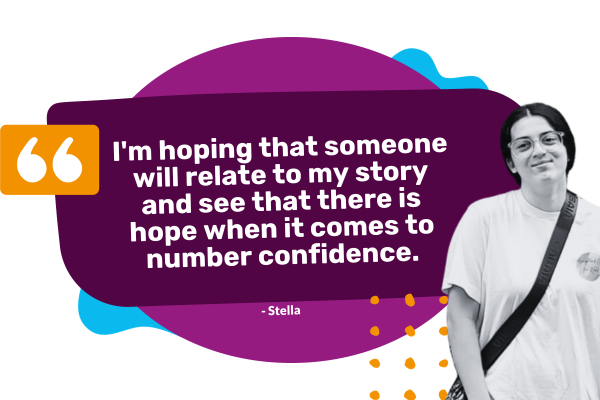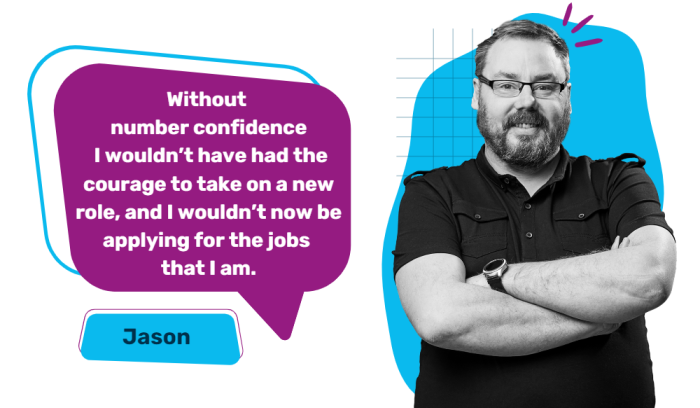How did you used to feel about maths?
I'd say frightened. I got diagnosed with moderate dyscalculia when I was eight, and when I walked into class it felt like a different language. I'd copy the person who sat next to me – I didn't know if their answers were right, I'd just copy them. And when the teacher asked me a question, I'd hope for the one child who always shouted the answer out, because then I'd just say, “Yes, that's the answer!”
Because I was used to getting it wrong, I was so nervous to get it wrong again.
Did being diagnosed with dyscalculia at a relatively young age help?
I got support through school from the school’s SENCo (Special Educational Needs Co-ordinator), and had extra time for my GCSEs, but even the SENCo of the school had to say, “I’ve not had someone with dyscalculia before, how can I support you?” It was nice she asked me, but they should be the ones who know. My mum’s a SENCo of a primary school and said there just aren’t enough resources for dyscalculia.
Do you find that people often think it's the same as dyslexia?
Yes, and I can understand why people categorise them together because they are similar in some ways, but they’re totally different as well. I had a tutor who specialised in dyslexia, and she was helpful because there are some similarities, but it’s not exactly the same and the difficulties everyone has will be different. But because it’s not as well-known, it is often easiest and quickest to compare it to dyslexia to explain it to people – even at university when I was applying for extra time for my course, I told my course leader about dyscalculia and she didn’t know what it was, so I had to say, “It’s like dyslexia with numbers”.
It is annoying that dyscalculia is not as recognised – it makes it feel like people don’t see it as important just because it’s not well-known.
I do think it’s easier for people to see how dyslexia impacts a whole range of subjects. Teachers immediately think, “oh that’s going to impact English, history, geography…” and maybe think that dyscalculia will only affect maths so don’t treat it with the same importance. But it does impact all your learning; things like timekeeping, which is something that myself and other people with dyscalculia can really struggle with, affect every part of your day!
Do you think there is a stigma around maths?
Yes, and I think a lot of people have a view that they’re either destined to do really well or really badly, and there’s no in-between. Even people without dyscalculia think that they’ll just never understand maths, and I think it’s because often maths is taught in such an arbitrary and confusing way and isn’t linked to real-life activities, which would help people to understand it so much better. I think there are also a lot of people who still think gender makes a difference – that boys are good at maths and girls aren’t.
What helped you the most to keep going with your own maths skills and qualifications?
I think the one thing that really helped me was that I had a really good teacher. She helped me build confidence, and used real-life examples when she explained the questions, which helped me to understand them. It also helped that because of COVID we weren’t going to sit an exam, instead we had teacher-assed grades, so that did take the pressure off a bit. Then around Easter of that year, I realised that for the first time I was actually doing maths questions independently to get better. I don’t think I’d ever really done that before. It took me years to get there – I was 16, and I finally felt like I could do maths outside of a lesson. But I think if I hadn’t had the support of people like my parents and teacher I’d be in a totally different place and wouldn’t have my GCSE. But even with the GCSE, which is great to have, it still affects your daily life.
I think people forget that maths doesn’t end with the exam.
Now that I’ve passed my GCSE and don’t have that pressure anymore, I’m finding it easier to have a really positive attitude towards maths, because I can focus on the maths I actually use in daily life.
How are you using maths in daily life, and how do you find it now?
I’ve just started university so I’m having to do lots of budgeting for the first time which I’m not great at! It’s made more difficult because spending isn’t physical – you’re just tapping your card or phone and can’t see the amount you have. It also impacts me when cooking which I’m also doing more now that I’m at university – as I said before, I struggle with timekeeping, so I have to make sure to use lots of timers because otherwise I will forget how long food has been in the oven for.
Before I was frightened of maths, but today I’d say I’m optimistic, I’m positive. One of my main anxieties was around my GCSE and the fear that I’d have to retake and grow more and more disheartened. I remember being 13 years old and seeing a statistic that children with dyscalculia are less likely to pass their Maths GCSE. I thought, “Great, I’m doomed.” But now that stress is gone and I’m thinking, “Okay, there’s no exam, let’s just think about how I can help myself in real life” – for cooking and timekeeping, rather than Pythagoras or simultaneous equations.
Why did you want to share your story through National Numeracy?
Last summer I did the free National Numeracy Challenge – I thought it was a clever way to get people back into maths because there’s no pressure when you’re doing it. Normally I’d have hesitated after my experience with maths, but I found it very engaging. Also, the website has statistics about how many adults lack number confidence, and you realise it’s a wider issue and not just you. And I love how there’s a whole page about dyscalculia on the National Numeracy website; a lot of websites just say, “You’re anxious with maths – let’s fix that”, but you actually talk about dyscalculia specifically and give advice on how you can still build your maths skills.
You give people a chance, and sometimes that’s all someone needs to better themselves.
After finding National Numeracy, I wanted to reach out because I realised there are going to be people who haven’t had the same circumstances as me or the same support. There was a girl at my school who had dyscalculia and had given up, and I thought, “I don’t want people to do that.” She had been doing Year 6 maths in Year 9 and I thought that must be so frustrating.
I remember having to do worksheets designed for 10-year-olds when I was 14 and you just feel so stupid.
I hope that by doing the National Numeracy Challenge and talking openly about it and number confidence, that it will help people. I’m hoping that one day someone will stumble across the website, relate to my story, and see that there is hope when it comes to number confidence. It can be really difficult, because not everyone has the money to invest in getting a diagnosis, or a tutor. But I hope that someday someone who has dyscalculia will maybe get the urge to go back to maths, even when they’re older, and think, “Let’s try again.” That would be so good if it happened!
Finally, what advice would you give to other people?
The first thing I’d say is don’t worry – especially if you’re doing GCSEs, it might seem like the end of the world, but there are alternatives out there, like Functional Skills which relates more to real life and might suit you better. And what I always tell myself is to read the question again and again and give yourself time to process it.
And I would also just say keep trying. Even though it feels like you’re not getting anywhere, you actually might be. And, if you can, enlist the help of other people to get you through it as well. Don’t be afraid to ask for help.
I wish to advocate that everyone can “do maths” – it’s just important to find a method that is as personalised as possible to your needs and preferences.






